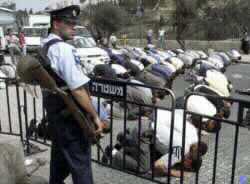- Author:
& News Agencies - Section:
WORLD HEADLINES
- Hajj & Umra WORLD HEADLINES
Palestinian killed in Gaza, resistance bombing foiled in Tel Aviv

A Palestinian was shot dead by Israeli occupation soldiers in the battered Gaza Strip town of Khan Yunis, the morning after security occupation forces foiled a resistance bombing in Tel Aviv.Arafat Abu Rujeila, 21, was hit in the head Saturday, by machine-gun fire from an Israeli tank just east of Khan Yunis.
His death raised the toll from the two-year-old Palestinian uprising to 2,579, including 1,912 Palestinians and 617 Israelis.
An occupation army spokesman said occupation soldiers had earlier arrested three activists of the resistance Islamic Palestinian group Hamas in the West Bank overnight.
Two men were siezed in the village of Beit al-Rush al-Fuqa, southwest of Hebron, and the third in Jama'in, near the northern city of Nablus.
The arrests came only hours after security personnel close to the US embassy in Tel Aviv chased down and overpowered a would-be bomber after he was prevented from entering a crowded beach-front cafe by a vigilant security guard, public radio reported.
The guard, who had spotted the bomb with a metal detector, ran after the assailant firing in the air to alert police around the compound.
The security personnel overpowered the man, taking the explosive belt off him before he could detonate it.
Officers carried out a controlled blast and took the man in for questioning.
"The 'resistance' bomber is still alive; we have no one injured in the incident," Tel Aviv police commander Uri Bar Lev told radio.
"The 'activist' had explosives on his body but, through the watchfulness of people and police in the area, an attack was prevented."
On Thursday, public vigilance also succeeded in limiting casualties from a botched bus bombing in the same city to just one dead, proving the value of Israel's hardline policies in the Palestinian territories, a government spokesman said.
A spokesman for Israeli Prime Minister Ariel Sharon put blame for the latest attempted bombing on the Palestinian leadership for "making no efforts to stop 'resistance' attacks", but praised the public for its high level of vigilance.
"The degree of alertness on the part of the public shows a determination to fight back and not to succumb to terror,"
Ranaan Gissin told AFP, noting that the quick action of members of the public had also limited the casualty toll from Thursday's bombing.
In that attack, the bomber was prevented from boarding a bus crowded with occupation soldiers in the eastern suburbs of Tel Aviv when the driver and a passenger wrestled him to the ground after he tripped and exposed his explosive belt.
The bomber succeeded in getting away, detonating his device in the open and fatally wounding an elderly woman and wounding another 29 people at an adjacent bus stop.
The bombing was the first resistance attack in Israel since one on a bus in central Tel Aviv on September 19.
Hamas had claimed responsibility for the attack, saying it was to avenge a controversial Israeli air raid on Gaza City in July that killed the group's military leader, his bodyguard and 15 civilians.
It was also intended as retaliation for an occupation army incursion into the Gaza Strip town of Khan Yunis Monday in which 17 people were killed, most of them civilians, the group's military wing said.
But Gissin insisted the growing success in countering attacks inside the Jewish state was a vindication of Israel's hardline tactics, which have included the reoccupation of virtually the entire West Bank as well as regular forays into the Gaza Strip.
"We've seen a growing decline in the capabilities of 'resistance' organisations to carry out successful operations," he said.
"There is a learning curve. They are trying to improve their attacks but we're improving our ability to stop them."
PHOTO CAPTION
An Israeli police officer watches Palestinian worshippers praying on the street as they were not allowed to enter Jerusalem's old city for Friday prayers, October 11, 2002. Israel curbed access to one of Islam's holiest sites to try to deter possible violence after the end of prayers. REUTERS/Mahfouz Abu Turk
Related Articles
 Hajj virtues
Hajj virtues
-
School of Faith in Ten Days of Thul-Hijjah
The believing human self needs strong provocations in order to awaken whenever it is enveloped by laziness in...
-
The Status of Hajj in Islam
Hajj is the fifth pillar of Islam; Allah, The Exalted, ordained it in the ninth year after Hijrah (the Prophet's,...
-
School of Faith in Ten Days of Thul-Hijjah
The believing human self needs strong provocations in order to awaken whenever it is enveloped by laziness in relation...


 Home
Home Discover Islam
Discover Islam Quran Recitations
Quran Recitations Lectures
Lectures
 Fatwa
Fatwa Articles
Articles Fiqh
Fiqh E-Books
E-Books Boys & Girls
Boys & Girls  Hajj Rulings
Hajj Rulings Hajj Fatwas
Hajj Fatwas












